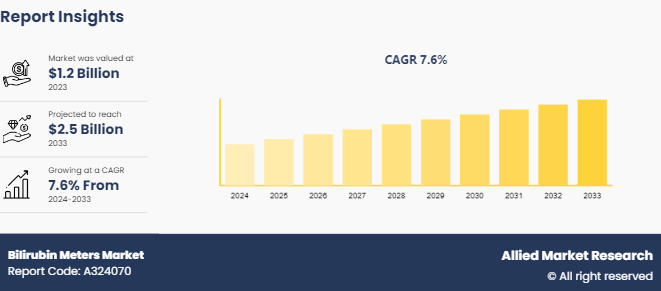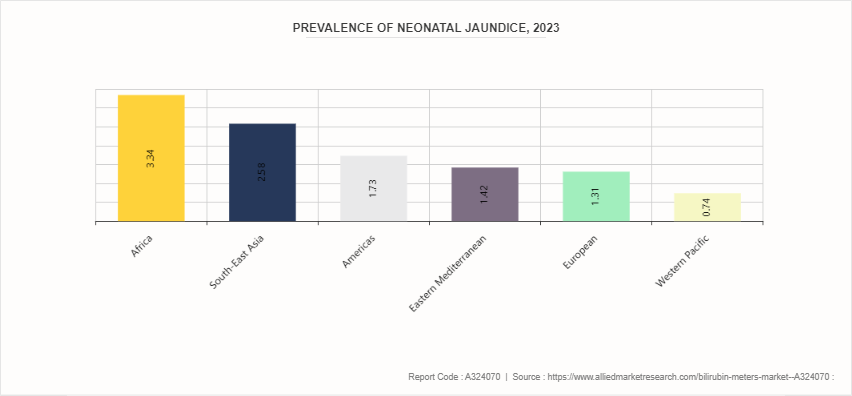Bilirubin Meters Market Research, 2033
The global bilirubin meters market size was valued at $1.2 billion in 2023, and is projected to reach $2.5 billion by 2033, growing at a CAGR of 7.6% from 2024 to 2033. The major factors driving the growth of the bilirubin meters market are increasing prevalence of neonatal jaundice, technological advancement, and rising adoption of point-of-care testing.

Market Introduction and Definition
Bilirubin meters, also known as bilirubinometers, are medical devices used to measure the levels of bilirubin in the blood. Bilirubin is a yellow pigment produced during the normal breakdown of red blood cells. Its levels are particularly important in newborns, as high concentrations can lead to jaundice, which if untreated, can cause serious health issues such as brain damage. These meters can be either invasive or non-invasive. Invasive methods typically involve drawing a blood sample from the patient and analyzing it in a laboratory. Non-invasive meters use transcutaneous measurements, which involve placing a sensor on the skin to estimate bilirubin levels by measuring the yellow pigment's intensity. These devices are widely used in neonatal care units for quick and reliable assessment, reducing the need for frequent blood draws and minimizing discomfort for newborn.
Key Takeaways
- The bilirubin meters market share study covers 20 countries. The research includes a segment analysis of each country in terms of value for the projected period.
- More than 1, 500 product literatures, industry releases, annual reports, and other such documents of major bilirubin meters industry participants along with authentic industry journals, trade associations' releases, and government websites have been reviewed for generating high-value industry insights.
- The study integrated high-quality data, professional opinions and analysis, and critical independent perspectives. The research approach is intended to provide a balanced view of global markets and to assist stakeholders in making educated decisions in order to achieve their most ambitious growth objectives.
Key Market Dynamics
According to bilirubin meters market forecast analysis, the key factors driving the growth of the market are rising prevalence of neonatal jaundice, technological advancement and developing healthcare infrastructure. Neonatal jaundice, characterized by high levels of bilirubin in the blood, is a common condition in newborns, affecting up to 60% of full-term and 80% of preterm infants. This has led to high emphasis on early detection and management to prevent severe complications such as kernicterus, a type of brain damage that can result from very high bilirubin levels. Bilirubin meters are essential for monitoring bilirubin levels in newborns, facilitate timely diagnosis and treatment, thereby reducing the risk of complications. According to a 2022 article by National Health Service, bilirubin can damage the brain and spinal cord, which can be life-threatening. Thus, the rising prevalence of neonatal jaundice is expected to contribute significantly in the bilirubin meters market growth.
In addition, according to bilirubin meters market trends analysis advancements in technology have also contributed to the development of more accurate, reliable, and easy-to-use bilirubin meters, further driving their adoption in both hospital and home settings. Additionally, increasing healthcare expenditures and initiatives aimed at improving neonatal care is expected to contribute significantly in the growth of the market. The increasing awareness among healthcare providers and parents about the importance of early detection and management of jaundice is boosting the demand for bilirubin meters. Additionally, advancements in medical technology have led to the development of more accurate, non-invasive, and user-friendly bilirubin meters, further propelling growth of bilirubin meters market size.
Rise in Prevalence of Severe Neonatal Jaundice
According to bilirubin meters market analysis increasing prevalence of severe neonatal jaundice is significantly impacting the bilirubin meters market. Neonatal jaundice, characterized by high levels of bilirubin in the blood, is a common condition in newborns that can lead to serious complications if not diagnosed and treated promptly. With the rise in cases of severe neonatal jaundice, there is a growing demand for accurate and reliable bilirubin meters to monitor and manage this condition effectively. This surge in demand is driving innovation and advancements in bilirubin meter technology, leading to the development of more sophisticated, non-invasive, and portable devices. Hospitals, clinics, and pediatric care centers are increasingly investing in these meters to ensure early detection and intervention, which is crucial for preventing long-term health issues in affected infants. Additionally, the increased focus on neonatal care in developing regions, where the incidence of jaundice is often higher due to limited access to prenatal care, is further propelling the market growth.

Market Segmentation
The bilirubin meters industry is segmented into product, indication, age group, end user and region. By product, the market is divided into bench-top, transcutaneous. By indication, the market is divided into jaundice and hepatitis. As per age group, the market is classified into neonatal and adults. By end user, the market is segregated into hospitals and nursing home, clinics, and others. Region wise, the market is analyzed across North America, Europe, Asia-Pacific, and LAMEA.
Regional/Country Market Outlook
North America dominated bilirubin meters market share in 2023 substantial research and development activities, a strong presence of major key players, well-established healthcare systems, high adoption of advanced medical technologies, and increasing prevalence of jaundice and hepatitis. However, according to bilirubin meters market opportunity analysis, the Asia-Pacific region is expected to register rapid growth due to improving healthcare infrastructure, rising healthcare expenditures, and increasing adoption of non-invasive bilirubin measurement methods. Countries like China and India are witnessing significant market growth due to rise in geriatric population and increasing healthcare investments.
- According to a 2024 article by National Library of Medicine, approximately 1.1 million neonates are affected by jaundice annually on a global scale, with the vast majority living in sub-Saharan Africa and southern Asia.
- According to 2022 article by World Bank, in 2022 the annual population change in India was about 0.7%. The rise in the number of newborns is expected to drive the demand of the bilirubin meters as they are crucial device to measure bilirubin levels in newborns.
- According to 2022 report by Centers for Disease Control and Prevention, South Asian Countries such as Bangladesh, China, and India have high prevalence of Hepatitis
Industry Trends
- According to a 2023 article by Royal College of Paediatrics and Child Health, neonatal jaundice affects approximately 60% of term and 80% of preterm infants within the first week of birth.
- According to a 2021 article by National Library of Medicine, periodic bilirubin monitoring is essential to identify infants at-risk and to initiate treatment including phototherapy.
- According to a 2024 article by National Library of Medicine, Inc, all national and international pediatric guidelines prescribe meticulous bilirubin screening for neonates as a critical measure to examine the incidence of acute bilirubin encephalopathy (ABE) and kernicterus in neonates.
Competitive Landscape
The major players operating in the bilirubin meters market include APEL Co. Ltd., Dragerwerk AG & Co. KGaA, Mennen Medical Ltd., Micro Lab Instruments, Ningbo David Medical Device Co. Ltd., Siemens Healthineers AG, Micro Labs Instruments, AVI Healthcare Pvt Ltd, F. Hoffmann-La Roche Ltd., and Koninklijke Philips N.V.
Key Sources Referred
- National Library of Medicine
- Center of Disease Control and Prevention
- World Bank
- World Health Organization
- Royal College of Paediatrics and Child Health
Key Benefits for Stakeholders
- This report provides a quantitative analysis of the market segments, current trends, estimations, and dynamics of the bilirubin meters market analysis from 2024 to 2033 to identify the prevailing bilirubin meters market opportunities.
- The market research is offered along with information related to key drivers, restraints, and opportunities.
- Porter's five forces analysis highlights the potency of buyers and suppliers to enable stakeholders make profit-oriented business decisions and strengthen their supplier-buyer network.
- In-depth analysis of the bilirubin meters market segmentation assists to determine the prevailing market opportunities.
- Major countries in each region are mapped according to their revenue contribution to the global market.
- Market player positioning facilitates benchmarking and provides a clear understanding of the present position of the market players.
- The report includes the analysis of the regional as well as global bilirubin meters market trends, key players, market segments, application areas, and market growth strategies.
Bilirubin Meters Market , by Product Report Highlights
| Aspects | Details |
| Market Size By 2033 | USD 2.5 Billion |
| Growth Rate | CAGR of 7.6% |
| Forecast period | 2024 - 2033 |
| Report Pages | 280 |
| By Region |
|
| By Product |
|
| By Indication |
|
| By Age Group |
|
| By End User |
|
| Key Market Players | Dragerwerk AG & Co. KGaA, APEL Co. Ltd, Micro Labs Instruments, Siemens Healthineers AG, Ningbo David Medical Device Co. Ltd, AVI Healthcare Pvt Ltd, Micro Lab Instruments, Mennen Medical Ltd, Koninklijke Philips N.V., F. Hoffmann-La Roche Ltd. |
The global bilirubin meters market size was valued at $1.2 billion in 2023.
The forecast period for Bilirubin Meters Market is 2024-2033.
The base year is 2023 in Bilirubin Meters Market
The market value of Bilirubin Meters Market is projected to reach $2.5 billion by 2033.
Major key players that operate in the Bilirubin Meters Market areAPEL Co. Ltd., Dragerwerk AG & Co. KGaA, Mennen Medical Ltd, and Micro Lab Instruments
Loading Table Of Content...


